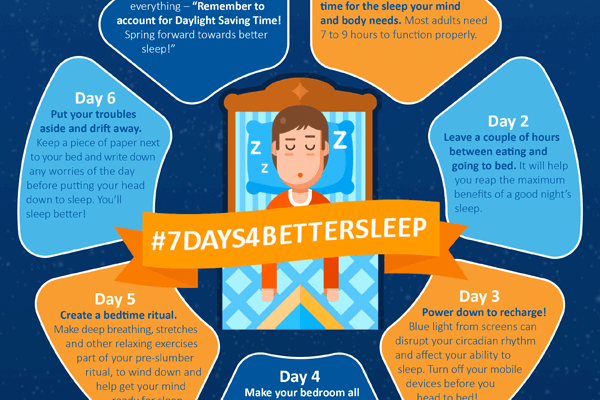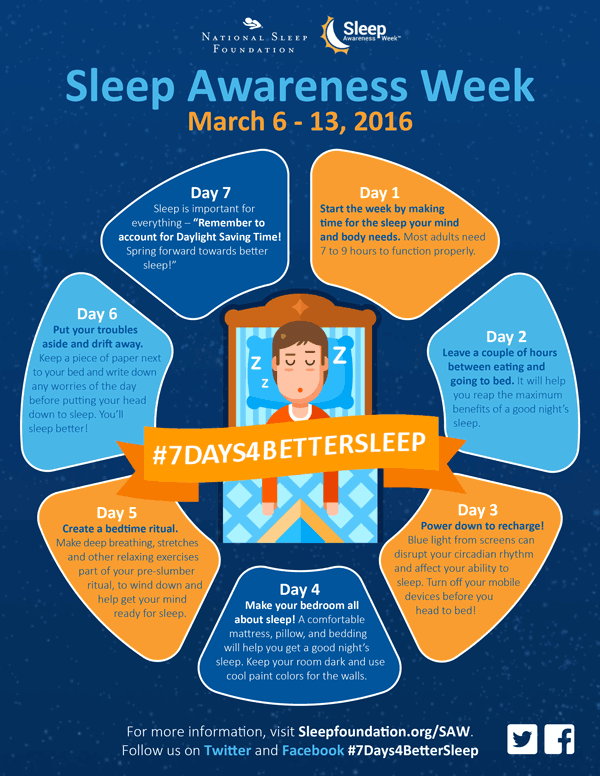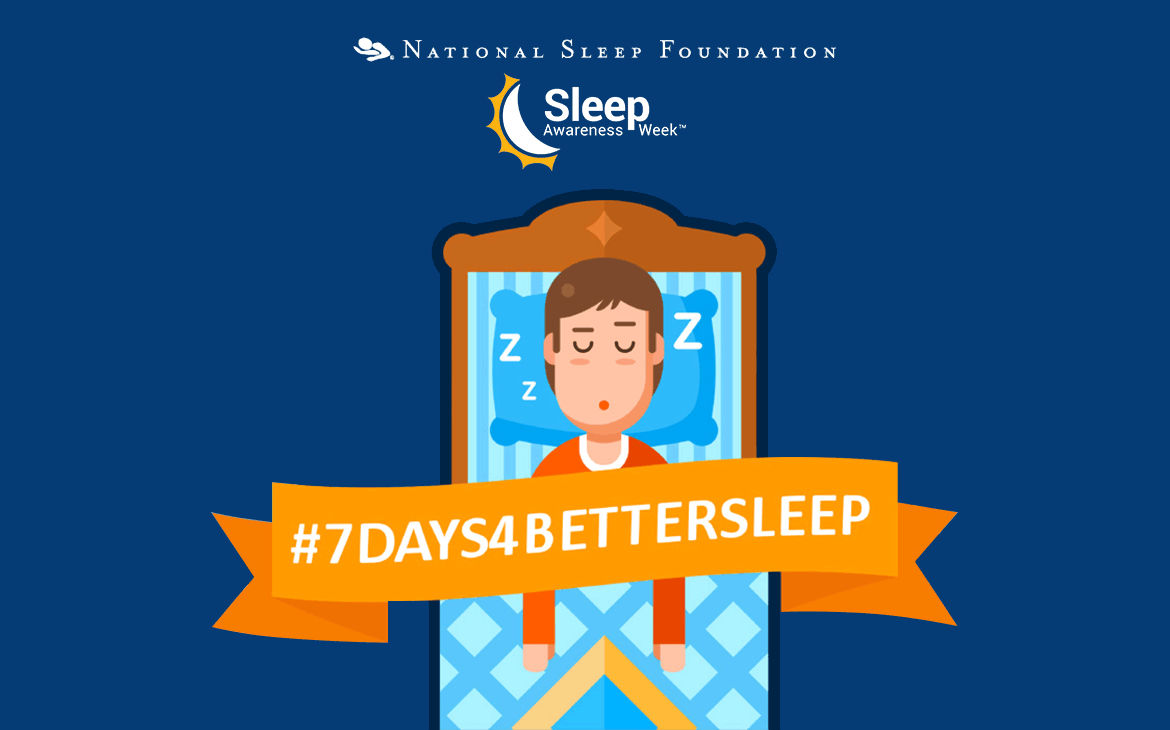Need to revamp your sleep schedule? Take part in Sleep Awareness Week with this seven day plan for better slumber.
Each spring, the National Sleep Foundation aims to raise awareness of common sleep problems and healthy habits, with the goal of helping America get better rest.
It’s an important objective, too. Recent studies from the U.S. Centers for Disease Control Verified Source Centers for Disease Control and Prevention (CDC) The United States’ health protection agency that defends against dangers to health and safety. View source show that over one-third of us regularly skimp on shut eye. Although it may not seem like a big deal to miss on out on rest, millions of drowsy people mean more dangerous roads, more costly health care, and reduced productivity.
Not to mention, sleep deprivation impairs learning, decision making, emotions, and adds stress. It also raises risks of heart disease, Alzheimer disease, diabetes, cancer, obesity and more — some of the most significant health concerns facing people today.
One of the best ways to improve your chances of a good night’s rest is adopting healthy sleep hygiene habits. Research has found that certain behaviors, like turning off electronics, sticking to a regular schedule, and avoiding caffeine late in the day are associated with more restful sleep and reduced risk of insomnia.
With Daylight Savings Time around the corner, it’s a good time to take a closer look at sleep and make sure you’re getting enough. To make the transition a little easier, the National Sleep Foundation Verified Source National Sleep Foundation Nonprofit focused on educating about sleep health. View source put together a seven day plan for incorporating some of these good habits into your routine. Their infographic below outlines the steps:

Day 1: Make Time for Sleep
Most adults need between seven to nine hours of sleep each night to feel their best. Think about how long you usually sleep when you don’t have to get up for anything, or what amount usually leaves you feeling awake and rested. Subtract that from the time you must wake up in the morning, and set a bedtime that allows you enough time to get ready for bed.
For example, if you need to be awake by 7 AM and you need 7.5 hours of sleep, getting ready for bed between 10:30 and 11 PM would be a good target. Kids can have significantly different sleep needs, so be sure to take the family’s schedule into account.
Day 2: Eat Dinner Before Bedtime
Going to bed on a full stomach can make sleep less restful, and certain foods contribute to uncomfortable indigestion and bloating. Eating before bed can also leave you with acid reflux and heartburn from lying down too soon after eating. The National Sleep Foundation’s experts say it’s best to eat dinner a couple of hours before bed so you still feel sated, but not full.
The types of foods you eat can also affect sleep. Studies have found that spicy and fatty foods can delay or make sleep less restful, while eating carbohydrates in the evening can contribute to better rest. Try preparing healthy, balanced dinners with moderate portions, and if you do get hungry later, choose smart bedtime snacks like crackers and peanut butter, oatmeal, or a small sandwich.
Day 3: Power Down Electronic Devices
Blue light emitted by televisions, computers, laptops and smartphones is known to disrupt melatonin, which has the effect of keeping you up later. They can also be distracting, and sometimes even distressing.
When you head to bed, make sure you put your phone, computer and TV to sleep, too. Some sleep experts suggest turning the television off at least an hour before bed to keep sleep clocks on track, especially for children.
Day 4: Make Your Bedroom Sleep-Friendly
Check your bedroom for potential sleep stealers, to ensure it’s helping and not hindering your efforts. An old or uncomfortable mattress, unsupportive pillows, or bedding that’s too hot or too cold can all make it harder to get to bed, and stay asleep throughout the night.
Your room’s temperature should be fairly cool, since studies show that cooler air supports faster, deeper sleep. Generally, the recommended range is between 65 and 72 degrees Fahrenheit. The NSF also recommends cool colors (think blues, greens, neutrals and pastels) for bedroom paint and decor.
Day 5: Start a Bedtime Ritual
Many parents know that a set routine is helpful for getting kids to settle down for bed, but having a pre-sleep ritual also helps us adults (particularly middle-age and younger adults). Most experts suggest no more than hour of variation from day to day, even on weekends, to keep your internal clock running smoothly.
Keeping bedtimes and wake times fairly regular helps normalize our internal circadian rhythm, so you feel drowsy around bedtime and awake during the day. Following a pattern can also tell your body that bedtime is coming, and including calming things like a warm bath, light stretching, or journaling help set the mood for sleep.
Day 6: Banish Stress and Worries Before Bed
Stress over the day’s events and future to-dos both contribute to sleeplessness, so if you find yourself tossing and turning, make an effort to decompress before bedtime.
One technique many people find helpful is jotting down your thoughts or concerns on a bedside notepad. Other proven ways to reduce stress include deep breathing and visualization. Regular exercise and stretching are both shown to help with stress management as well. Try different things and see what works best for you.
Day 7: Keep it Up, and Mark Your Calendar!
When things like Daylight Savings Time and vacations come up, plan in advance and adjust your schedule gradually if possible to minimize impact and stay well-rested. During March, we “spring forward,” meaning you’ll lose an hour of sleep, and in November, we “fall back,” so you’ll gain an hour (unless you’re in Arizona, Hawaii, or other regions where DST is not observed).
Most of all, continue sticking with your healthier habits. Much of it goes hand in hand with healthy living, such as eating a balanced diet, occasional exercise and practicing moderation. When things do get off track from time to time, don’t stress too much (worrying about sleep itself can actually be counterproductive!) Instead, work on gradually reintroducing these good habits back into your routine for better sleep and better health.

About the author
Rosie Osmun, a Certified Sleep Science Coach, brings a wealth of knowledge and expertise to the health and wellness industry. With a degree in Political Science and Government from Arizona State University College of Liberal Arts and Sciences, Rosie's academic achievements provide a solid foundation for her work in sleep and wellness. With over 13 years of experience in the beauty, health, sleep, and wellness industries, Rosie has developed a comprehensive understanding of the science of sleep and its influence on overall health and wellbeing. Her commitment to enhancing sleep quality is reflected in her practical, evidence-based advice and tips. As a regular contributor to the Amerisleep blog, Rosie specializes in reducing back pain while sleeping, optimizing dinners for better sleep, and improving productivity in the mornings. Her articles showcase her fascination with the science of sleep and her dedication to researching and writing about beds. Rosie's contributions to a variety of publications, including Forbes, Bustle, and Healthline, as well as her regular contributions to the Amerisleep blog, underscore her authority in her field. These platforms, recognizing her expertise, rely on her to provide accurate and pertinent information to their readers. Additionally, Rosie's work has been featured in reputable publications like Byrdie, Lifehacker, Men's Journal, EatingWell, and Medical Daily, further solidifying her expertise in the field.
View all posts




